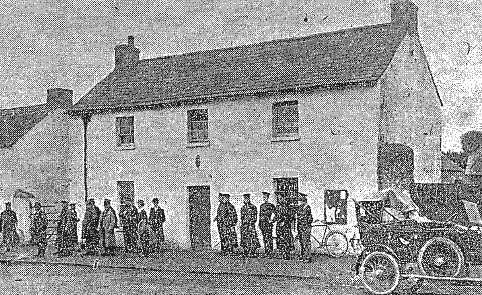Constable killed in daring attack on Meath police barracks
Navan, 4 November 1919 - An attack on a police barracks in Ballivor, Co. Meath, on 31 October, has resulted in the death of a policeman, Constable William Agar.
The constable was sitting by a fire in the day-room of the barracks with colleagues shortly after 10pm, when he responded to a knock on the door.
As soon as he opened the door, he was struck by two bullets, one of which ruptured his heart. ‘I am shot, I am shot’, the constable shouted before falling to the ground. According to a colleague, he was dead in about 30 seconds.
About 20 masked men then rushed into the barracks, gathering up all of the weapons and ammunition they could find before taking off in the direction of the Kildalkey Road. An almost simultaneous raid was carried out on the barracks in Lismullen, although there are no reports of casualties.
Irish newspapers have condemned these attacks. The Irish Times has said that the raiders were intent on ‘deliberate murder’ and had planned their arrival and escape in motor cars. The paper also argues that the killing of Constable Agar was ‘as foul and heartless as the murder of Constable Downing in Dublin’ a fortnight earlier.
Agar is the 10th RIC man to have been killed in politically-motivated shootings since the start of the year. Three members of the DMP have been killed in the same period.

|

|
Top: Constable Leonard, Sergeant Terence McDermott, the sergeant's son and Constable Shannon - these men along with Constable Agar made up the garrison of the barracks. Bottom: The funeral of Constable Agar, which took place on 3 November. (Images: Freeman's Journal, 4 November 1919)
All of these attacks have been condemned by the Catholic Church, with the Bishop of Meath recently saying that he believes them to have been carried out by a highly organised group. The bishop’s statement echoed remarks made by Lord French who, speaking at New Brighton in late October, attributed the spate of assassinations in Ireland to a ‘secret army called the Irish Volunteers’.
The first incident of this kind occurred in Soloheadbeg in January when Constables McDonnell and O'Connell were shot while escorting gelignite to a local quarry. This case was brought back to the public’s attention last month, as compensation of £1,500 and £1,300 have been granted to the relatives of the two men.
Since then, there has been an escalation in the pressure being applied to police in the Tipperary area and elsewhere. In recent days documents have been discovered which state: ‘Anyone giving information about the shooting of peelers will meet the same fate as the peelers.’ The notices further state that anyone who was convicted of having given information to the police would be deemed to have forfeited his life, and would be shot or hanged.
[Editor's note: This is an article from Century Ireland, a fortnightly online newspaper, written from the perspective of a journalist 100 years ago, based on news reports of the time.]





















